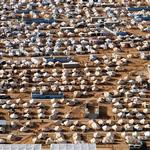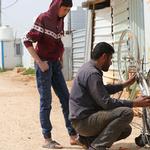15 March: Sanctuary in the City? Assisting Urban Refugees in 21st Century
<div class="event-icon"></div> <span>Save this event in my Outlook calendar</span>
<div class="event-icon"></div> <span>Save this event in my Google Calendar</span>
An increasing number of refugees live in poor neighborhoods in towns and cities across the Middle East, a premier refugee region with one of the world's highest urbanization levels. While host states have taken in millions of refugees, they do not have the resources to provide for them. Aiding refugees living in cities and urban areas is therefore a major challenge to humanitarian policy.
For many refugees, cities are viewed as the best option to provide for themselves and their families. However, cities can also turn into "poverty traps", were the refugees survive below subsistence levels. Urban refugees also compete with other urban dwellers for housing, jobs and services. This can strain host-guest relations and cause a backlash against refugees both on the local and national level.
While the size and complexity of cities account for some of the problems facing refuges, they are also part of the solution. Cities have larger and often unregulated labour markets, more shelter options and ready access to health and school facilities. Cities and towns can also offer greater freedom of movement and foster self-reliance as well as better prospects for successful socio-economic integration and entrepreneurship.
This panel will discuss new ways to assist the urban displaced in the 21st century. How can humanitarian policies be re-designed to accommodate refugees in urban areas? Can refugees find "sanctuary in the city"? How can host countries and donors assist refugees living among the urban poor in inner-city slums?
With:
Dlawer Ala'Aldeen (Middle East Research Institute -MERI, Erbil)
Nasser Yassin (American University of Beirut, AUB)
Ahmet Içduygu (Koch University, Istanbul)
Jeff Crisp (Refugee Studies Centre, Oxford)
With special comments from this year's speaker at the 2018 Chr. Michelsen lecture:
Alexander Betts (Oxford University)
Chairs: Are John Knudsen and Sarah Tobin
Projects

SuperCamp: Genealogies of Humanitarian Containment in the Middle East


